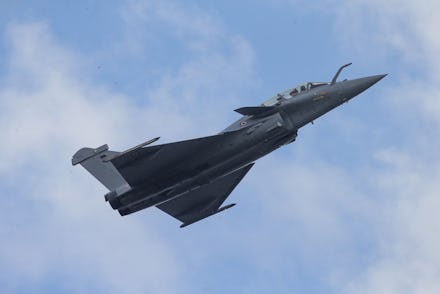If You Get Dizzy When You Stand Up, Use this Fighter Pilot Secret

Have you ever stood up too quickly — especially after a long period of sitting — and felt lightheaded?
If so, you've experienced orthostatic hypotension, better known as head rush. That sudden bout of dizziness is a "form of low blood pressure that happens when you stand up from sitting or lying down," according to the Mayo Clinic.
When head rush hits, you could collapse against a wall or feel around for a nearby piece of furniture. Or, as genius reddit user Mnementh2230 pointed out, you could do what fighter pilots do — clench the muscles in your lower body to push blood back into your upper body:
If you stand up too quickly and start to feel light headed, it's caused by a drop in blood pressure in your head and upper body. It's the same reason fighter pilots black out in high G turns, and the Air Force figured out a way to combat this decades ago: clench the muscles in your lower body, starting with your calves, then thighs, then your abs and lower back. This squeezes blood back up in to your upper body and will resolve the issue very quickly — the real trick is remembering to do it in that moment.
Yep, it's the real deal: Here on the ground, our bodies are used to functioning at 1 G — in other words, the acceleration due to gravity on the Earth's surface.
But when fighter pilots make steep turns and hurtle toward the ground, they "experience forces of acceleration equivalent to many times the force of gravity," according to the Federal Aviation Administration. The higher the G-force, the harder it is for their bodies to pump blood from their hearts to their brains, according to PBS.
"Most of us would pass out with head-to-toe G forces of just 4 or 5 because our hearts can't summon the necessary pressure," PBS reported. "Blood pools in our lower extremities, and our brains fail to get enough oxygen."
To fight the blood pressure drop, fighter pilots wear "anti-G suits" that "constrict the legs and abdomen during high Gs to keep blood in the upper body," according to PBS. They also reportedly use "muscle-tensing techniques."
There you have it: Just clench those lower body muscles. You may look like you're pooping your pants, but at least you won't feel like you're about to pass out.